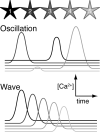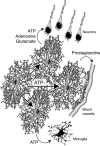Astrocytes and ischemic injury
- PMID: 19064795
- PMCID: PMC2653262
- DOI: 10.1161/STROKEAHA.108.533166
Astrocytes and ischemic injury
Abstract
Ischemic injury is traditionally viewed from an axiomatic perspective of neuronal loss. Yet the ischemic infarct encompasses all cell types, including astrocytes. This review will discuss the idea that astrocytes play a fundamental role in the pathogenesis of ischemic neuronal death. It is proposed that stroke injury is primarily a consequence of the failure of astrocytes to support the essential metabolic needs of neurons. This "gliocentric view" of stroke injury predicts that pharmacological interventions specifically targeting neurons are unlikely to succeed, because it is not feasible to preserve neuronal viability in an environment that fails to meet essential metabolic requirements. Neuroprotective efforts targeting the functional integrity of astrocytes may constitute a superior strategy for future neuroprotection.
Figures


References
-
- Haydon PG. Glia: Listening and talking to the synapse. Nat Rev Neurosci. 2001;2:185–193. - PubMed
-
- Volterra A, Meldolesi J. Astrocytes, from brain glue to communication elements: The revolution continues. Nat Rev Neurosci. 2005;6:626–640. - PubMed
-
- Nedergaard M. Direct signaling from astrocytes to neurons in cultures of mammalian brain cells. Science. 1994;263:1768–1771. - PubMed
-
- Parpura V, Basarsky TA, Liu F, Jeftinija K, Jeftinija S, Haydon PG. Glutamate-mediated astrocyte-neuron signalling. Nature. 1994;369:744–747. - PubMed
-
- Araque A, Parpura V, Sanzgiri RP, Haydon PG. Tripartite synapses: Glia, the unacknowledged partner. Trends Neurosci. 1999;22:208–215. 205_00001349. - PubMed
Publication types
MeSH terms
Substances
Grants and funding
LinkOut - more resources
Full Text Sources
Other Literature Sources

